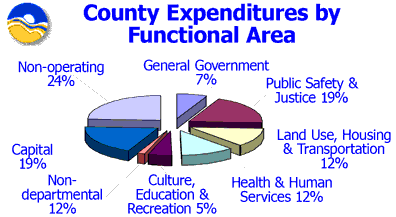 |
Previous Issues |
| Cedar Mill Community Website |
|
| Search the Cedar Mill News: | About The Cedar Mill News |
|
|||||||
| Volume 8, Issue 4 | April 2010 |
||||||
Powers that be
|
 |
Non-Operating expenditures provide an internal service for the entire County organization and are divided into four areas; Debt and Other Financing, Risk Management and Insurance, Replacement/Reserves, and Miscellaneous. The Capital portion of the budget includes two main areas, Transportation (95% of the total), and Facilities and Technology. The rest of the budget items shown are operating expenditures—the recurring costs associated with providing public services to County residents, including staffing. |
The Washington County Strategic Plan organizes the government into five functional areas: general government; public safety; land use, housing and transportation; health and human services; and culture, education and recreation. The total Washington County budget for 2009-2010 is $652.1 million ($16.4 million (2% less than last year) and employs about 1700 people. The Board is responsible for creating a proposed annual operating budget and capital program that complies with State law, and specifies procedures to be used for its financial management. The Board also creates a five-year projection of the operating budget and capital program which compares the proposed budget to such projections made in the previous five years. The projections are informational and not binding upon the future actions of the Board.
By law, the County Commissioners are the Board of Directors for both Clean Water Services and the Washington County Housing Authority. Although Clean Water Services maintains a close working relationship with Washington County government, it is a special service district that serves as a separately-managed and -financed public utility. The Housing Authority remains a separate legal entity and contracts with the County to implement and administer Housing Authority programs and all support services through the county’s Department of Housing Services.
All Commissioners serve on committees for the Washington County Budget, Enhanced Sheriff Patrol District (ESPD), and Urban Roads Maintenance District (URMD) Budget. The Commissioners enter into Intergovernmental Agreements (IGAs) with cities and agencies for purposes of cooperation and coordination. The URMD was formed through an IGA in 1999 and provides funds for maintaining the local neighborhood streets in the county’s UUA that lie within the URMD boundaries.
Individual Commissioners serve as county representatives on a total of 30 different boards, commissions, committees and councils, such as the Public Safety Coordinating Council, Tualatin Basin Water Supply Project Steering Committee, Urban and Rural Reserves Committee, Urbanization Forum Steering Committee, several Metro Policy Advisory Committees, Rural Roads Operations and Maintenance Advisory Committee, Hillsboro Airport Issues Roundtable, Regional Investment Board, the Commission on Children and Families, and the Vision Action Network.
It is an incredible amount of work requiring interactions with virtually every municipality and jurisdiction in the county, region and state, to say nothing of the efforts to respond to the needs and concerns of their constituents.
In the last two elections in 2006 and 2008, the undervote (those who voted but who didn’t vote for their district’s commissioner) was nearly 50%. Those elections were uncontested—only one announced candidate—so hopefully with a vigorously contested election on May 18, you will turn in your ballot and vote for this extremely important position!
Published monthly by Cedar Mill Advertising & Design
Publisher/Editor:Virginia Bruce
503-629-5799
PO Box 91061
Portland, Oregon 97291